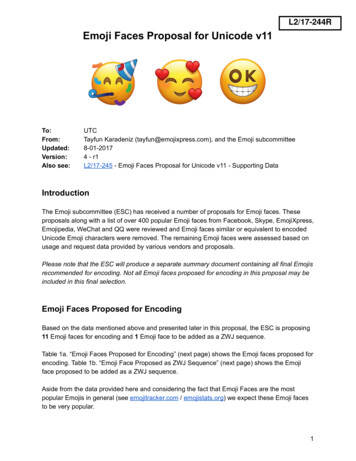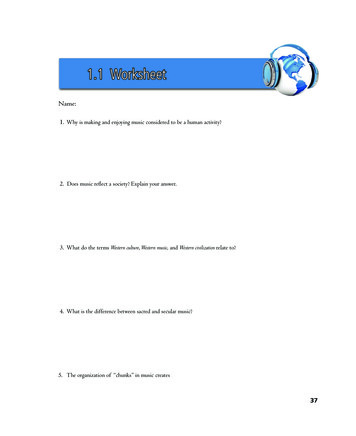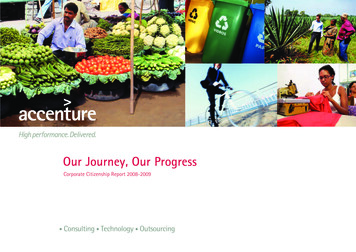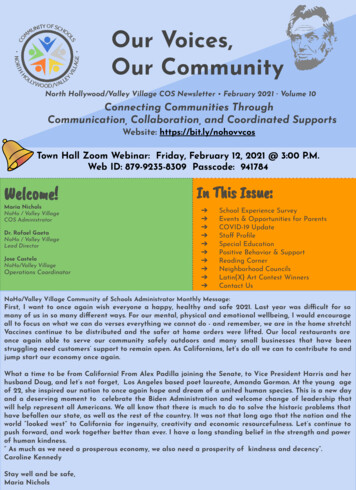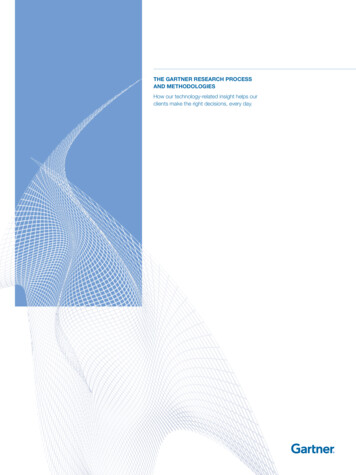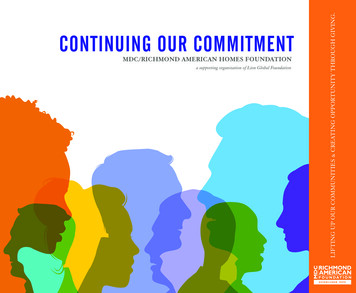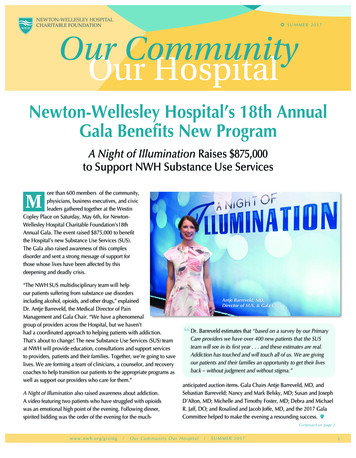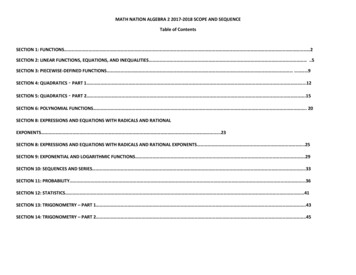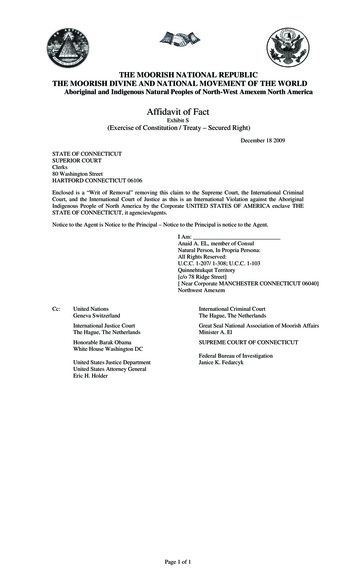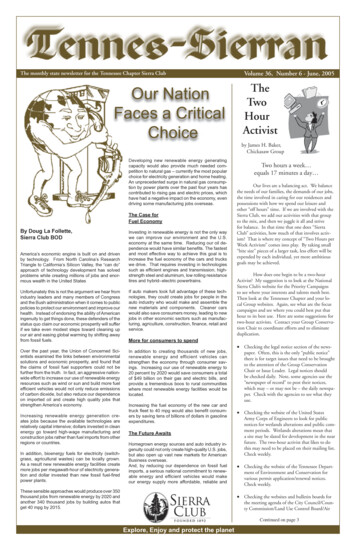
Transcription
The monthly state newsletter for the Tennessee Chapter Sierra ClubOur NationFaces a CriticalChoiceDeveloping new renewable energy generatingcapacity would also provide much needed competition to natural gas – currently the most popularchoice for electricity generation and home heating.An unprecedented surge in natural gas consumption by power plants over the past four years hascontributed to rising gas and electric prices, whichhave had a negative impact on the economy, evendriving some manufacturing jobs overseas.The Case forFuel EconomyBy Doug La Follette,Sierra Club BODAmerica’s economic engine is built on and drivenby technology. From North Carolina’s ResearchTriangle to California’s Silicon Valley, the “can do”approach of technology development has solvedproblems while creating millions of jobs and enormous wealth in the United StatesInvesting in renewable energy is not the only waywe can improve our environment and the U.S.economy at the same time. Reducing our oil dependence would have similar benefits. The fastestand most effective way to achieve this goal is toincrease the fuel economy of the cars and truckswe drive. That requires investing in technologiessuch as efficient engines and transmission, highstrength steel and aluminum, low rolling resistancetires and hybrid–electric powertrains.Unfortunately this is not the argument we hear fromindustry leaders and many members of Congressand the Bush administration when it comes to publicpolicies to protect our environment and improve ourhealth. Instead of endorsing the ability of Americaningenuity to get things done, these defenders of thestatus quo claim our economic prosperity will sufferif we take even modest steps toward cleaning upour air and easing global warming by shifting awayfrom fossil fuels.If auto makers took full advantage of these technologies, they could create jobs for people in theauto industry who would make and assemble thenew materials and components. Cleaner carswould also save consumers money, leading to newjobs in other economic sectors such as manufacturing, agriculture, construction, finance, retail andservice.Over the past year, the Union of Concerned Scientists examined the links between environmentalsolutions and economic prosperity, and found thatthe claims of fossil fuel supporters could not befurther from the truth. In fact, an aggressive nationwide effort to increase our use of renewable energyresources such as wind or sun and build more fuelefficient vehicles would not only reduce emissionsof carbon dioxide, but also reduce our dependenceon imported oil and create high quality jobs thatstrengthen America’s economy.In addition to creating thousands of new jobs,renewable energy and efficient vehicles canstrengthen the economy through consumer savings. Increasing our use of renewable energy to20 percent by 2020 would save consumers a totalof 49 billion on their gas and electric bills, andprovide a tremendous boos to rural communitieswhere most renewable energy facilities would belocated.Increasing renewable energy generation creates jobs because the available technologies arerelatively capital intensive; dollars invested in cleanenergy go toward high-wage manufacturing andconstruction jobs rather than fuel imports from otherregions or countries.In addition, bioenergy fuels for electricity (switchgrass, agricultural wastes) can be locally grown.As a result new renewable energy facilities createmore jobs per megawatt-hour of electricity generation and dollar invested than new fossil fuel-firedpower plants.More for consumers to spendIncreasing the fuel economy of the new car andtruck fleet to 40 mpg would also benefit consumers by saving tens of billions of dollars in gasolineexpenditures.The Future AwaitsHomegrown energy sources and auto industry ingenuity could not only create high-quality U.S. jobs,but also open up vast new markets for AmericanBusiness overseas.And, by reducing our dependence on fossil fuelimports, a serious national commitment to renewable energy and efficient vehicles would makeour energy supply more affordable, reliable andThese sensible approaches would produce over 350thousand jobs from renewable energy by 2020 andanother 340 thousand jobs by building autos thatget 40 mpg by 2015.Volume 36, Number 6 - June, 2005TheTwoHourActivistby James H. Baker,Chickasaw GroupTwo hours a week equals 17 minutes a day Our lives are a balancing act. We balancethe needs of our families, the demands of our jobs,the time involved in caring for our residences andpossessions with how we spend our leisure andother “off hours” time. If we are involved with theSierra Club, we add our activities with that groupto the mix, and then we juggle it all and strivefor balance. In that time that one does “SierraClub” activities, how much of that involves activism? That is where my concept of “Two Hours perWeek Activism” comes into play. By taking small“bite size” pieces of a larger task, less effort will beexpended by each individual, yet more ambitiousgoals may be achieved.How does one begin to be a two-hourActivist? My suggestion is to look at the NationalSierra Club’s website for the Priority Campaignsto see where your interests and talents mesh best.Then look at the Tennessee Chapter and your local Group websites. Again, see what are the focuscampaigns and see where you could best put thathour to its best use. Here are some suggestions fortwo-hour activists. Contact your Group Conservation Chair to coordinate efforts and to eliminateduplication. Checking the legal notice section of the newspaper. Often, this is the only “public notice”there is for target issues that need to be broughtto the attention of the Group ConservationChair or Issue Leader. Legal notices shouldbe checked daily. Note, some agencies use the“newspaper of record” to post their notices,which may – or may not be – the daily newspaper. Check with the agencies to see what theyuse. Checking the website of the United StatesArmy Corps of Engineers to look for publicnotices for wetlands alterations and public comment periods. Wetlands alterations mean thata site may be slated for development in the nearfuture. The two-hour activist that likes to dothis may need to be placed on their mailing list.Check weekly. Checking the website of the Tennessee Department of Environment and Conservation forvarious permit application/renewal notices.Check weekly. Checking the websites and bulletin boards forthe meeting agenda of the City Council/County Commission/Land Use Control Board/AirContinued on page 3Explore,enjoyandand protectprotect theExplore,Enjoytheplanetplanet
Sierra Club OfficersTennes-SierranThe monthly newsletter of theTennessee Chapter of the Sierra Club.*Email: address.changes@sierraclub.org*Snail Mail: clip the Moving? coupon below and mail*Address changes are processed much faster if you include your Sierra Club membership number. To find your membership number,look on the address label of this newsletter.SEND ARTICLES TO:Email: TennesSierran@aol.comSnail Mail: Rachel Floyd, Tennes-Sierran Chief Editor3223 Caldwell Road - Ashland City, TN 37015(615) 792-2590Submission DEADLINE is the 5th of the month preceding the new month’s issue.1. Email and email attached files are preferred. Send to TennesSierran@aol.com either with embedded text messages,or attached files in PC-based formats. Mac users should embed text in body of an email message only.2. Photographs should be scanned in a .jpg or .tif file format, whenever possible, then either attached to email or mailedvia US Postal Service (USPS) on a 3 ½ diskette or CD Rom. Please include a stamped, self-addressed envelope if youwould like your diskette or photo prints returned.3. Hard-copy handwritten or typewritten articles may be accepted; however, pre-approval from the Editor is required.4. Any materials submitted via USPS mail cannot be returned unless a stamped, self- addressed envelope is provided.The opinions expressed in the Tennes-Sierran are those of the contributors and do not necessarilyreflect the official views or policies of the Tennessee Chapter, or the Sierra Club.My new address is:NameAddressCity/St/ZipCurrent Address:Member ID#Don Richardson (901) 276-1387donrich@juno.comVice Chair:Catherine Murray (423) y Butcher(615) 347-1480JLCLBUTCH@comcast.netTreasurer:Katherine Pendleton (615) 943-6877Katibug1959@aol.comConservation: Gary Bowers(615) 366-4738GB1Nature@aol.comMembership: Dick Mochow (901) 274-1510dinimo@earthlink.netTN Local Groups:ARTICLE SUBMISSION GUIDELINES:Attach mailing address label in this box, orfill in current name, address & MembershipID#Tennessee Chapter:Chair:SEND CHANGE OF ADDRESS TO:Moving?(List in Transition for 2005)Mail to:Sierra ClubP.O. Box 52968Boulder, Colorado80322-2968or Email to:address.changes@sierraclub.org(be sure to include your member ID#)Cherokee Group - air:Terry Miller(423) 842-5053trmcha@comcast.netVice Chair:Henry Spratt, Ph.D.Henry-Spratt@utc.eduConservation: Rick Gehrke(423) 843-9625rick.gehrke@comcast.netOutings:Chris O’Connor (423) 867-4957chris o77@yahoo.comChickasaw Group - :Charlie Rond(901) 452-8150chasrond@bellsouth.netVice Chair:Carolyn Pierce (901) 755-5635cedpierce2000@yahoo.comConservation: James Baker(901) 372-6717aubrey kimo@worldnet.att.netOutings:Judith Hammond (901) 276-2819Jhammond@tnqio.sdps.orgHarvey Broome Group - Knoxville/Oak Ridgewww.tennessee.sierraclub.org/broomeChair:Axel r: Beverly Smith(865) 531-8480Blsmith1300@comcast.netConservation: David Ron Shrieves (865) 922-3518rshrieve@utk.eduMiddle Tennessee Group - mtgChair:Caty Butcher(615) 347-1480JLCLBUTCH@comcast.netVice Chair: Jeremy DoochinDoochers87@aol.comConservation: Diane Perschbacher (615) 895-1236Diane@Propson.comOutings:Katherine Pendleton (615) 943-6877Katibug1959@aol.comState of Franklin Group- Bristol/Johnson ir:Linda C. Modica (423) 753-9697lcmodica@aol.comConservation: Catherine Murray (423) 929-8163Cfvcatherine@worldnet.att.netUpper Cumberland Group - ggy Evans (931) 432-6680maevans@twlakes.netVice-ChairJosie McQuail (931) 372-6142Jmcquail@tntech.eduConservation Mary Mastin(931) 268-2938zeblady@twlakes.netOutings:John Harwood (931) 528-6395jharwood@tntech.eduTennessee Sierra Staff:Rita Harris, Community OrganizerEnvironmental Justice Programrita.harris@sierraclub.org(901) 324-7757Please notify the Editorwhen changes are neededPage 2 - June, 2005The Tennes-Sierran
Sierra Summit 2005TheTwo HourActivistEnergize the Movement at our Largest Gathering in HistoryContinued from page 1Sierra Club‛s NationalEnvironmentalConvention and ExpositionSan FranciscoSeptember 8-11, 2005Registrations are coming in! The Sierra Summitwill be the largest gathering held by theSierra Club in its 113-year history, and willserve as an important milestone in theenvironmental movement. This four-dayevent-taking place September 8-11 inSan Francisco will be a huge opportunity forattendees to explore, enjoy, and protect theplanet through a fun andrich learning experience.This is also a unique opportunity to energize theenvironmental movement at a critical time, anda chance for all people who enjoy the planet andare concerned about its protection to supportvisioning the future. “This will be a richexperience for all of us,” says ExecutiveDirector Carl Pope, “Good things happen whenso many come together to shape the future.Through it, we will further build community andarticulate hope and our values.”There will be a myriad of workshops oneverything from “Backyard Organics” and“Eating Smart”, to “Photography & Nature” and“Restoring the Wild.” There will also be anexhibit hall filled with the latestenvironmentally sensitive technologies andProducts, and Sierra Showcase will display theaccomplishments of our chapters, groups andcommittees. Speakers will include one of thecountry‛s environmental champions and one ofTime magazine‛s “Heroes for the Planet” forfighting to restore the Hudson River, Robert F.Kennedy, Jr. Other speakers include formerPoet Laureate Robert Hass, chef Alice Waters,and professor George Lakoff.The Summit will include the Sierra ClubStrategic Direction Setting process which will be the most inclusive andextensive direction setting process the Club has ever had with 1,000delegates from across the country. And as part of the pre-Summitpreparation all members are invited to participate in online discussions athttp://www.sierraclub.org/summitforum Click on the “register” link at thetop to get your password emailed to you and join in!And of course no Sierra Club event would be the same without outdooractivities, and there will be a number of hikes and other fun opportunitiesto get outdoors and socialize. It will be a great chance to network and learnwith other Sierra members and leaders from around the country.Everyone is welcome to attend, have fun and learn about the exciting waysto enjoy and protect the planet. To register, go to www.sierrasummit2005.org and either complete the form online or mail or fax it in. You can also call(301) 694-5243 or e-mail scs051.attendee@expoexchange.com .The Tennes-SierranQuality Board and other bodies. Thetwo-hour activist that likes to do thismay need to be placed on their mailinglists. Check weekly. The website of the Local EmergencyPlanning Committee should be checkedmonthly. Checking the Right to Know websiteto research on toxic chemical releases tothe land, water and air. Check monthly. One could collaborate with othersto report those releases in an article inthe Tennes-Sierran.In this Internet culture, publicnotices of meetings and public commentperiods are on the Internet as a matter ofcourse. Sometimes, paper copies are placedon bulletin boards and there are mailing listsfor some of this, but the Internet is far moreconvenient.It has been my experience, if onesees an issue early enough, one has a farbetter chance of resolving that issue withsuccess than letting it get so close it willbe inside of one’s reaction time. That iswhy these notices and websites should beregularly checked and reported to the IssueLeader(s) and Conservation Chair, by bothe-mail and phone (computers do crash).Speaking of meetings. To myknowledge, all of the above meetings arePublic Meetings, as required by law. Bigproblem, these meetings are often held inthe early afternoon, when most people areat work, doing the “8-5”. Here is whereretired and self-employed two-hour activistscome into play. They may have the moreflexible schedule, without having to takevacation time or other personal leave. Thesemeetings last often more than two hours,but that is the price to pay. It will be a greatand glorious day when the decision makerssee a large number of Sierra Club membersparticipating at each meeting, rather thanthe tiny handful that they may interpret as“the usual suspects”, or “those who have toomuch time on their hands”.What are the benefits of two-houractivism? There is a quote; “many handsmake light work.” The Tennessee Chapterhas slightly over 7,000 members. If eachmember of the Tennessee Chapter did twohour’s work a week as an activist, meaningonly once a week, over 14,000 hours ofenvironmental activism would be generated.In a single year, these same 7,000 activists would generate over 728,000 hours ofactivism for the environment or effectively83 years of work – in only a year. It fairlyboggles the mind, but the Tennessee Chapter would become an unstoppable juggernaut, much to the chagrin of the pollutersand despoilers of Tennessee.Tick tock 17 minutesa day won’t you join us for two-hour aweek activism?June, 2005 - Page 3
STATE OF FRANKLIN GROUP(Tri-Cities)HARVEY BROOME GROUP (Knoxville)PROGRAM MEETING: June 14 Harvey BroomeGroup Program meeting: Jill Wolverton and KelleySegars from the Knoxville Regional TransportationPlanning Organization, will be talking about twoprograms that promote alternative transportation:the Smart Trips program and the Bicycle Program.The Smart Trips program works with employers tohelp them encourage employees to use alternatives todriving alone. The Bicycle Program strives to makebicycling an integral part of the transportation systemthrough such things as road improvements, installingbike racks and helping people find safe routes to work.STRATEGY MEETING: 4th Tuesday each monthalso at Unitarian Church. Non-members welcome atall HBG events. Call Axel Ringe at 865-397-1840oremail at onyxfarm@bellsouth.netSTRATEGY MEETINGS:Second Monday of everymonth, 7pm, HolstonValley Unitarian Universalist Church. These Executive Committee/Conservationmeetings are open to everyone interestedin helping to protect upper east TN’s air,water, forests & family farms. To place an item onthe agenda, or for directions to the Church, pleasecontact Linda Modica, Group Chair, (423) 753-9697,lcmodica@aol.com.PROGRAM MEETINGS: Fourth Monday of everymonth, 7pm, Holston Valley Unitarian UniversalistChurch. Programs on environmental issues, travel, nature photography are among the many topics featuredat SOFG program meetings. FMI: Mary Gavlik, ViceChair, (423) 434-9535, mlgav@yahoo.com.CHEROKEE GROUP (Chattanooga)PROGRAM MEETING: For additional information,contact Rick Gehrke 423-843-9625 or email rick.gehrke@comcast.netCHICKASAW GROUP (Memphis)MIDDLE TENNESSEE GROUP (Nashville)PROGRAM MEETING: Thursday, (June 9), 7:00p.m. at Radnor Lake Visitor Center in Nashville.Our program this month will inspire anyone who hasdreamed of climbing Half Dome or El Capitan inYosemite National Park. Join us for a Sierra Club Productions film, “Vertical Frontier, A History of the Art,Sport and Philosophy of Rock Climbing in Yosemite,”narrated by Tom Brokaw. From John Muir in the1860s to the super athletes of today, Vertical Frontiertells the rich and compelling saga of the free-spirited climbers whose contribution to mountaineeringtechniques, equipment and ethics allowed them to bethe first to conquer the legendary big walls of Yosemite.Illustrated by spectacular old and new footage shot onthose granite walls, the story is told by the climberswhose artistry and sheer determination allowed themto launch a sport now enjoyed by millions throughoutthe world. Our outings chair, Katherine Pendleton,recently vacationed at Yosemite, and will show a fewphotos from her trip after the film. Light refreshmentswill be served; please feel free to bring your favorite reusable cup and napkin. For more information on thisprogram, contact Shelli Dimarco at (615) 260-0030.(Enter the Radnor Lake area on Otter Creek Road,accessible only from Granny White Pike.) Non-members are always welcome!STRATEGY MEETING: Wednesday, (June 22)at 6:30 p.m. Conservation issues are first on theagenda! Come and get the news on what’s happening in our Middle Tennessee Group. All members areinvited to attend our conservation and administrative meeting on the 4th floor at 2021 21st AvenueSouth (the old St. Bernard Academy Building). Wewelcome you to be with us to learn about the group’sconservation initiatives and community activities. Forconservation issues or additions to the conservationagenda, contact Diane Perschbacher at 615-895-1236or e-mail Diane@Propson.com. For additions to theadministrative agenda or for more information regarding the meetings, send a message to Caty Butcher atjlclbutch@comcast.net or call 226-8925.CONSERVATION MEETING: Contact DianePerschbacher at 615-895-1236 or Diane@Propson.com for the next meeting place and time. We continueto move forward with wetlands training and outings,energy conservation, and work with MPO on alternative transportationUPPER CUMBERLAND GROUP (Cookeville)PROGRAM MEETING: Contact Peggy Evans at931-432-66
contributed to rising gas and electric prices, which have had a negative impact on the economy, even driving some manufacturing jobs overseas. The Case for Fuel Economy Investing in renewable energy is not the only way we can improve our environment and the U.S. economy at the same time.
